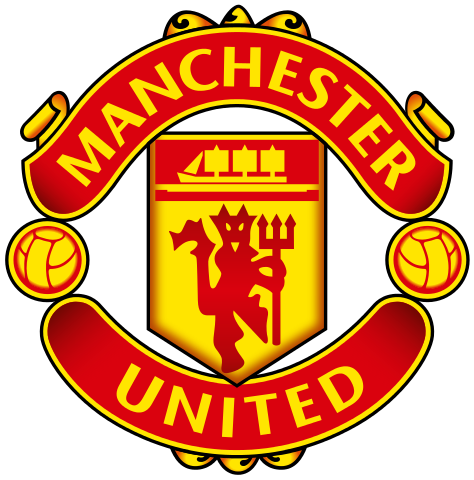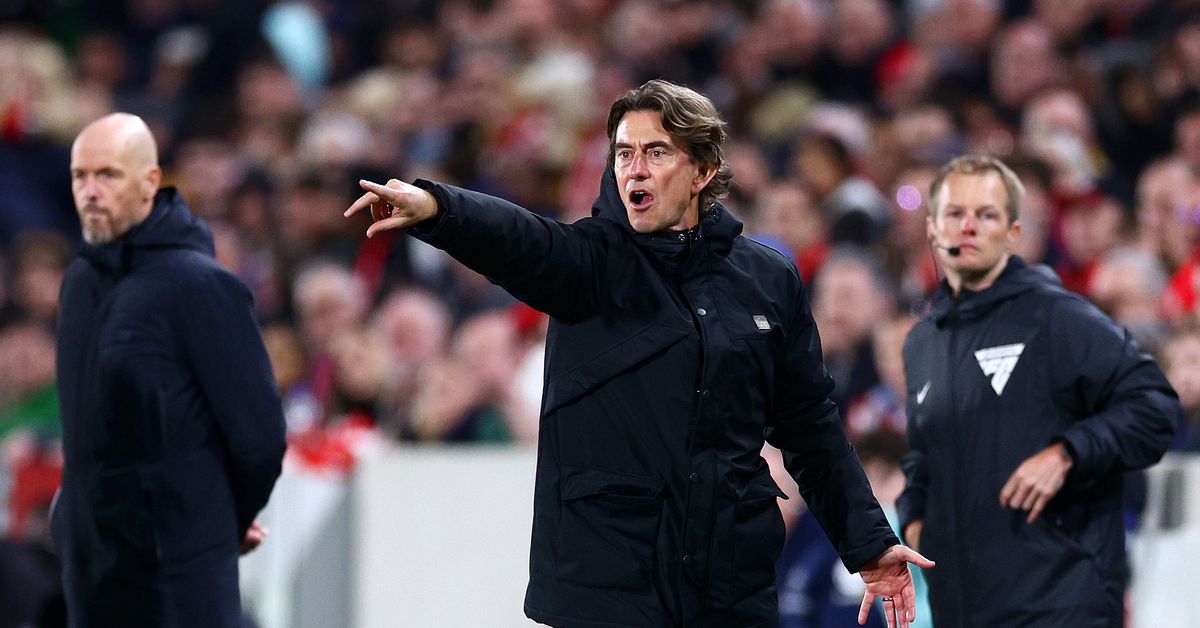Article has quite a few short videos, so it’s better to follow the link. Basically, setup isn’t getting the best out of players and is wearing them out.
Here’s the text:
Manchester United were this close to stealing a thoroughly undeserved win on Saturday. Mason Mount’s 96th-minute winner against Brentford looked as if United were going to steal three points in a match where they were dominated in every facet of the game.
At the beginning of the season Grace Robertson tweeted, “A lot of people primarily watch football for an excuse for a good moan.” Football fans love a good moan, but what they love even more than moaning, is pointing the finger at something.
Football discourse in 2024 needs to blame someone or something for what’s happened. The way the news cycle and social media work these days when something happens there’s no time for a detailed explanation. Instead, there needs to be a sudden visceral reaction. This is the fault of x. When a goal is scored
A defender’s job is to prevent goals from being scored. If a goal is scored that means someone didn’t do their job. Therefore the goal is their fault. Even if there’s a whole chain of breakdowns it’s typically the last action that will be blamed, unless you’ve got an agenda against one of the players in the chain, then a screenshot will be taken of the mistake that player made - stripping out all context - and laying the blame at his feet.
For whatever reason, not everyone is a fan of Aaron Wan-Bissaka. Therefore when United conceded a late equalizer to Brentford on Saturday, it wasn’t surprising to see the following image popping up all over social media blaming Wan-Bissaka for playing Ivan Toney onside to set up Brentford’s equalizer.
That screen shot make it look like Wan-Bissaka is a complete idiot, undoing all the work of the rest of United’s defense. The screenshot strips out all context. It’s just a one second look at a sequence that had multiple breakdowns from multiple players.
How did this goal happen?
When you start to dig deeper to try to answer that question you see that the tactical choices United made over the course of the full match lead them to this moment. The choices United made over 90 minutes will have different effects on different players, culminating in this entire sequence.
We’re not hear to break down what United’s tactical plan was and whether it was good or not. Rather we’re just looking at what they did, and how that’s going to affect players.
For instance, once again United went with the narrow high press they always use but never works, where they leave the wide man open.
Every team in the league knows to break this press all you have to do is get the ball to the wide man, and it’s not particularly difficult to do that.
Once you get it to the wide man you’ve got a free run up the pitch to run at United’s defenders.
This style forces the attackers to do a ton of useless running that simply serves to tire them out. This hangs the defense out to dry. They can’t keep their high line because they have no protection. The ball carrier has all the time in the world to pick out a runner if they don’t retreat. They’re forced to play on their heels and get their ass back.
As the opponent now can attack with pace, the bypassed forwards have to high-tail it back to help out their defenders. When they get back on defense they get all the way back. United have nine outfield players in and around their own box
Having all the forwards come all the way back to the box thus prevents United from being able to launch counterattacks because for one, they don’t have an outlet high up the pitch, and two, they’re too freakin tired. They’re wasting their energy with the pointless running.
Then when they do finally get some space to run into, the fatigue starts to set in. They’re a step slower. There’s less power behind their shot. Rather than having that burst of pace that they should have they opt to pass the ball and it ends up being a poor ball. Physical fatigue leads to more mental errors.
As United can’t counter, they need to build up and attack the slow way. With Erik Ten Hag that means getting men forward. and having your wingers - who happen to be your best goal scorers - get as wide as they can on the touchline while your fullbacks attack the dangerous half-spaces.
Occasionally it will also mean having one winger come over and overloading one side. But this doesn’t free up your second winger to get into a dangerous position. No, your wingers still end up glued to the touchline, while your fullback - who is not known for his attacking ability - can push up and join the forward line.
It’s hard to see how this setup is going to yield strong attacking results. What’s most likely to happen is eventually someone is going to get frustrated and try to dribble through people themselves and lose the ball, or someone is going to make a bad pass or take a bad touch and lose the ball. Once you lose the ball, since you have so many people forward it only takes one pass to get the ball behind you - leaving a whole team of players having to hustle back.
In United’s dumbass attacking setup, it’s often their best attackers like Bruno or Rashford who are the deepest players and now are the ones who need to run back the hardest to defend, further tiring them out for their next foray forward.
Meanwhile, while the forwards get back to do the initial defending, the fullbacks still have to spring back on defense to get back into position. Then when United eventually win the ball back, they’ll need to run forward again because they have an important position to get to at the top of the attack.
Back and forth back and forth. This is… a lot of running that the fullbacks have to do over the course of a 90-minute game (which is even longer due to added time). It’s incredibly tiring. You can’t expect a fullback to have the same energy levels that he has in the 15th minute in the 75th minute, let alone the 95th minute. It wears you down as the game goes on.
That takes us to injury time and how the equalizer came about. United scored to take a 1-0 lead. Brentford kick-off and immediately launched a long ball down the left side. Without facing any pressure, United dropped their whole team deep. So deep that when United wins the initial ball, the header goes beyond their front line and is easily scooped up by Brentford.
It’s hard for United to close these guys down because, well they’re tired. They’ve been doing a lot of useless running all game to wear down their legs. Stopping, changing direction, and starting again is difficult to do on tired legs.
At this point, we have the culmination of several themes United often display. They’ve dropped everyone deep, yet there are still about five Brentford players who are pretty free. The most open of them all is the far-side winger. Of course, he is. United have been leaving the wide player open all season long!
Brentford plays the ball out wide and Wan-Bissaka steps out to pick up the man and initially blocks Mbeuno’s cross. That’s when Mbeuno gets some help from Mads Roerslev on the overlap. Initially, AWB stays with Mbeuno while Casemiro tries to step out and pick up Roerslev, but Casemiro’s legs went a long time ago. Roerslev easily beats him down the byline and is free to whip in a cross. This is where all of United’s problems begin.
As you can, United has seven men inside the box plus Casemiro and AWB just out wide of the box. Their furthest player forward is Rasmus Hojlund who is just outside the box. Everyone is back.
United win the initial header from the cross but of course, it easily goes beyond any United player allowing Brentford to easily keep up the pressure.
There’s a failure there. A header was never going to get this ball out very far. There are so many players back deep that there’s no one on the next line to help get the ball clear. Rather than putting out the attack, you’re giving the ball back to Brentford and saying “Come again.”
Wan-Bissaka jumps to block the cross and ends up as the deepest United player when he lands. As soon as the ball gets headed away he starts running out along with the rest of his teammates. But he’s got more ground to cover, Brentford takes one touch before on their next touch they cross it back in.
Wan-Bissaka doesn’t get out of the danger area fast enough. Could he have run harder? Sure, but we also can’t forget, it’s the 98th minute and he’s been running up and down the pitch for all those minutes. All that running back and forth to join every attack and then high tail it back to prevent a transition has taken a toll on his legs. That quick burst you might expect to have on your first step isn’t there anymore. Not to mention, this was just the second game he’s started since January! His body isn’t fully used to this again.
Of course, it’s not like Ivan Toney brought the ball down and scored right away. There were still several breakdowns that occurred after the cross was played. Lisandro Martinez did his usual let the attacker bring the ball down then try to make the tackle rather than fight for the header only to then woof on the tackle not once but twice.
Furthermore, go back to where everyone was when the cross was initially played and AWB is playing everyone onside. Look at where Diogo Dalot is in relation to goal scorer Kristoffer Ajer.
Merely five seconds later Ajer is alone in the middle of the box, not a United player anywhere near him.
All it takes is one simple pass, and United concede from a simple cutback just like they’ve been doing all year.
Thomas Frank knew exactly what United was going to do on Saturday and had a plan to exploit it. Erik Ten Hag had no answers as the 16th-placed team in the league ran rampant over United. Brentford is the second-worst finishing team in the league and that lack of finishing was the only reason this match was even close after 30 minutes.
United didn’t drop two points Saturday because Aaron Wan-Bissaka played Ivan Toney onside. They dropped two points because they had a poor tactical plan, never adapted to Brentford, and ran their players into the ground. What happens at the end of a match isn’t just caused by what’s happening at the end of the match. The decisions you make early on in the match can affect the end just as well. It all adds up. Against Brentford, all those decisions throughout the game culminated with one sequence that gave Brentford an equalizer.


